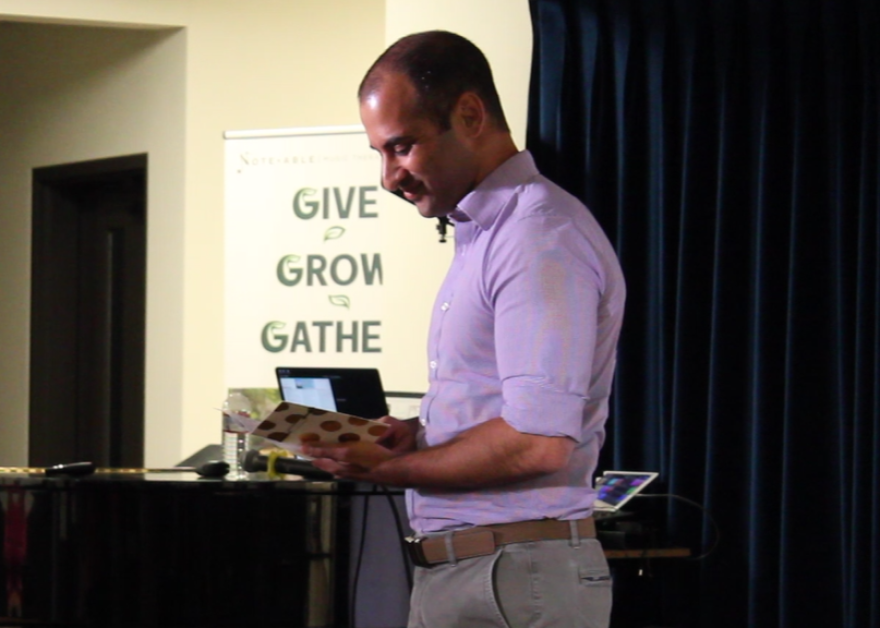People gasped and looked away as Dr. Feroze Sidhwa showed the photos he took in Gaza.
Nine-year old Zhuri lay on a gurney. She was rolled into the pre-op area for no reason that anybody knew. There was no one else there except for Sidwah and one nurse. Zhuri's right arm and both legs were broken. Old bandages covered her infected wounds. But it was clear that she was dying of septic shock.
Sidhwa recalled how she screamed and cried out for her dad. He later found a large number of maggots in her wounds. It took 10 days, 40 hours on the operating table, and six surgeons before she was stable. Zhuri was reunited with her dad shortly after. She eventually made it safely to Egypt with her aunt, Sidwah said.
This was his second time in Gaza helping civilian casualties. But he’s also volunteered in several other countries — including Ukraine, Haiti and Zimbabwe.
Sidhwa works as a trauma surgeon in Stockton, Calif. He came to Reno to talk at an event organized by CODE Pink. Sidhwa has been vocal about his experience in Gaza. He’s spoken to communities all over the nation and testified in front of the UN Security Council earlier this year.
“The things that you see in Gaza are very different from when you work somewhere else… “, Sidhwa said.
Sidhwa spoke matter of factly — as if he’s describing a routine day at the office. He said doctors in Gaza have become desensitized from the horrors they’ve seen.
“More aid workers have been killed in Gaza than virtually every other conflict in the history of the world combined.” Sidhwa said. “Gaza is also the most dangerous place in the world to be a child.”
According to the Aid Workers Security Database, 383 aid workers were killed in 2024. Over 180 of them were in Gaza. The United Nations International Children’s Emergency Fund says more than 50,000 children have been killed or injured in Gaza since October 2023.
In an interview with KUNR before the presentation, Sidhwa shared a story of five-year-old Sham and her mother. An aerial blitz sent the hospital into mass casualty mode. Sidhwa found Sham on the floor. Shrapnel had hit the left side of her brain. This is usually a deadly injury.
But Sham survived.
“The first thing she said to her mom was, ‘Mommy, I want eggs and juice. She says, of course, of course, you can have anything you want.’” Sidhwa said. “As her mom put her back into the bed, her mom's knees just went weak, and she just collapsed on the floor sobbing because she realized there's no juice, there's no eggs, she can't get her any of these things.”
According to the United Nations Food Programme, one third of the population is not eating for days on end. And nearly half a million people are at risk of starvation. International aid groups have called on Israel to stop blocking aid.
Aon Samara sat listening to Sidhwa. The 15-year-old says the doctor’s words hit close to home.
“I'm a big family man. I mean, my siblings are on my wallpaper. It just hurts to think about, oh, what if those were my siblings?” Samara said.
Aon’s family is Palestinian. They moved to Reno in 2015 from Jordan. And they weren’t the only Palestinians in the room.
Yousef Abedallah is a third year medical student at the Latin American School of Medicine in Cuba. He grew up in Gaza. Abedallah moved to Cuba in 2021, where he met his fiance who is from Reno.
They were in town getting married. Abedallah got to meet his new in-laws, but his own family is still in Gaza.
“No es una guerra, es una genocida,” Abedallah said. (It’s not a war, it’s a genocide)
The couple is fundraising to support Palestinian medical students at their school who can’t connect with family members. Abedallah hopes to return to Gaza to help his people after graduation.
Following the talk, Sidhwa answered a few questions from the audience. Some wanted to know what the everyday American could do.
“We're nowhere near doing everything we can [in] the political space,” Sidhwa said. “The only thing you can do to your congressman is not write them a letter, [...] But letter writing is what you do when you have politicians who actually give a damn what you think”
Sidhwa said that America’s involvement in this conflict cannot be denied. He urges concerned Americans to unite their community.
Sidhwa said voting could make a larger impact than donating. While he isn’t encouraging people to stop the donations, he said talking to your neighbors is the path forward.
Dr. Sidwah is set to return to Gaza in November.
“We have to learn better ways of influencing the government. Because if we don’t… the blood is on our hands, and it’s going to be pretty hard to wash it off,” Sidhwa said.


